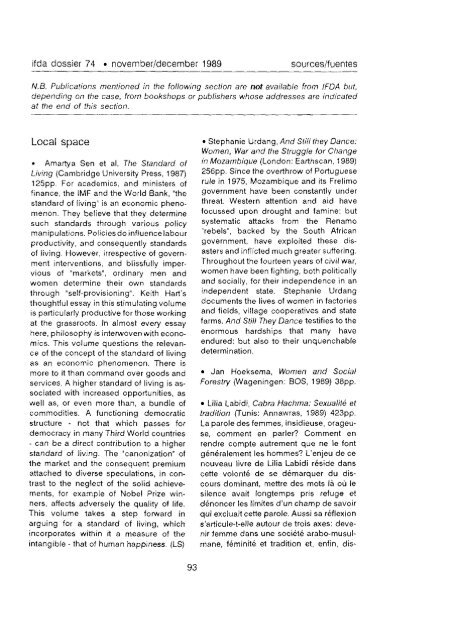ifda dossier 74 - Dag Hammarskjöld Foundation
ifda dossier 74 - Dag Hammarskjöld Foundation
ifda dossier 74 - Dag Hammarskjöld Foundation
You also want an ePaper? Increase the reach of your titles
YUMPU automatically turns print PDFs into web optimized ePapers that Google loves.
<strong>ifda</strong> <strong>dossier</strong> <strong>74</strong> november/december 1989 sources/fuentes<br />
N.B. Publications mentioned in the following section are not available from IFDA but,<br />
depending on the case, from bookshops or publishers whose addresses are indicated<br />
at the end of this section.<br />
Local space<br />
Amartya Sen et al, The Standard of<br />
Living (Cambridge University Press, 1987)<br />
125pp. For academics, and ministers of<br />
finance, the IMF and the World Bank, "the<br />
standard of living" is an economic pheno-<br />
menon. They believe that they determine<br />
such standards through various policy<br />
manipulations. Policiesdo influencelabour<br />
productivity, and consequently standards<br />
of living. However, irrespective of govern-<br />
ment interventions, and blissfully imper-<br />
vious of "markets", ordinary men and<br />
women determine their own standards<br />
through "self-provisioning". Keith Hart's<br />
thoughtful essay in this stimulating volume<br />
is particularly productive for those working<br />
at the grassroots. In almost every essay<br />
here, philosophy is interwoven with econo-<br />
mics. This volume questions the relevan-<br />
ce of the concept of the standard of living<br />
as an economic phenomenon. There is<br />
more to it than command over goods and<br />
services. A higher standard of living is as-<br />
sociated with increased opportunities, as<br />
well as, or even more than, a bundle of<br />
commodities. A functioning democratic<br />
structure - not that which passes for<br />
democracy in many Third World countries<br />
- can be a direct contribution to a higher<br />
standard of living. The "canonization" of<br />
the market and the consequent premium<br />
attached to diverse speculations, in con-<br />
trast to the neglect of the solid achieve-<br />
ments, for example of Nobel Prize win-<br />
ners, affects adversely the quality of life.<br />
This volume takes a step forward in<br />
arguing for a standard of living, which<br />
incorporates within it a measure of the<br />
intangible - that of human happiness. (LS)<br />
Stephanie Urdang, And Still they Dance:<br />
Women, War and the Struggle for Change<br />
in Mozambique (London: Earthscan, 1989)<br />
256pp. Since the overthrow of Portuguese<br />
rule in 1975, Mozambique and its Frelimo<br />
government have been constantly under<br />
threat. Western attention and aid have<br />
focussed upon drought and famine: but<br />
systematic attacks from the Renamo<br />
'rebels", backed by the South African<br />
government, have exploited these dis-<br />
asters and inflicted much greater suffering.<br />
Throughout the fourteen years of civil war,<br />
women have been fighting, both politically<br />
and socially, for their independence in an<br />
independent state, Stephanie Urdang<br />
documents the lives of women in factories<br />
and fields, village cooperatives and state<br />
farms. And Still They Dance testifies to the<br />
enormous hardships that many have<br />
endured: but also to their unquenchable<br />
determination.<br />
Jan Hoeksema, Women and Social<br />
Forestry (Wageningen: BOS, 1989) 38pp.<br />
Lilia Labidi, Cabra Hachma: Sexualite et<br />
tradition (Tunis: Annawras, 1989) 423pp.<br />
La parole des femmes, insidieuse, orageu-<br />
se, comment en parler? Comment en<br />
rendre compte autrement que ne Ie font<br />
generalement les hommes? L'enjeu de ce<br />
nouveau livre de Lilia Labidi reside dans<br />
cette volonte de se demarquer du dis-<br />
cours dominant, rnettre des mots la ou Ie<br />
silence avait longtemps prfs refuge et<br />
denoncer les limites d'un champ de savoir<br />
qui excluait cette parole. Aussi sa reflexion<br />
s'articule-t-elle autour de trois axes: deve-<br />
nir fernme dans une societe arabo-musul-<br />
mane, feminite et tradition et, enfin, dis-
















